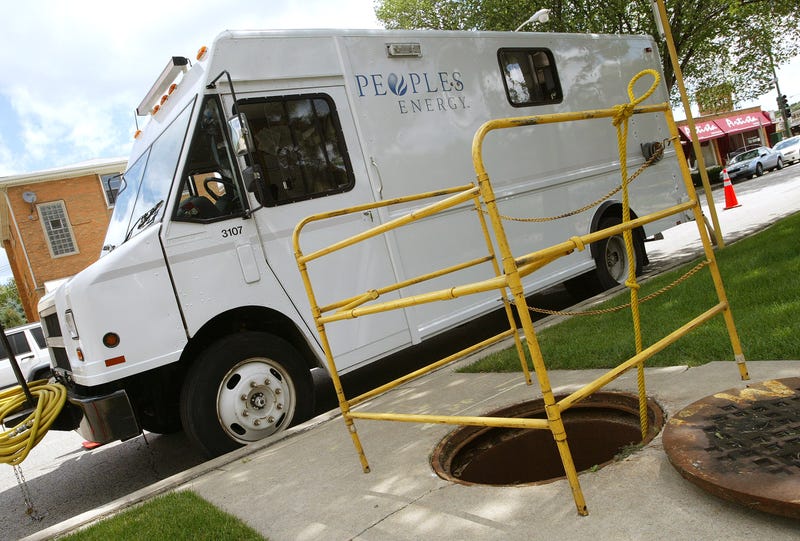
(WBBM NEWSRADIO) — A controversial program that consumer watchdogs claim has driven up your natural gas bills for years, is about to restart.
State regulators on Thursday ordered Peoples Gas to limit its program to replace hundreds of miles of old natural gas pipelines.
“Chicagoans deserve a safe, reliable gas system. Today's decision focuses the company's efforts to ensure the system remains safe. It is now on Peoples Gas to change its approach,” Illinois Commerce Commission (ICC) Commissioner Stacy Peradas said.
Back in 2023, the ICC ordered Peoples to stop its pipeline replacement program while investigators looked into why it was running years behind schedule and billions of dollars over budget.
Commissioner Stacy Paradis said the utility must limit the scope of its program from replacing all its pipes to focusing just on the oldest and most leak-prone lines.
“With this order, Peoples Gas will return to work with the direction to prioritize retirement of cast iron and ductile iron pipe. According to the company, there are 1,112 miles of CIDI pipes still in use.”
The commission ordered the Chicago gas utility to complete the replacement of iron pipes by 2035.
“Numerous engineering studies recommended this time frame, and it provides accountability and focus to ensure that Peoples Gas accomplishes this important safety directive.”
In a statement, Illinois PIRG says this could significantly reduce future rate hikes. The estimated current cost of the project is $10.5 billion.
But, Peoples Gas says the direction given by the Commission, compared to the prior approach, "may necessitate additional cost and more construction sites disrupting streets across city neighborhoods."
When the pipeline saga began almost two decades ago, the massive project was estimated to cost less than $2 billion to replace more than 2,000 miles of aging underground pipes by 2030. It has already cost $3.3 billion, with only 38% of the work completed.
The commission, whose five members were all appointed by Gov. JB Pritzker, ordered Peoples Gas to halt the work in late 2023 for a state review of the spending.
Pritzker wants to wean the state off fossil fuels in favor of renewable sources by 2050 under the Climate and Equitable Jobs Act he signed in 2021 — but the state has made only limited progress.
Peoples Gas executives and leaders of labor unions responsible for the work decried the stoppage, calling it a critical safety threat, with some pipes that were more than a century old. The utility said that natural gas is still more affordable than renewable energy alternatives for most of its 890,000-plus Chicago customers.
But consumer watchdogs have long derided the project as a boondoggle for ratepayers, fueling record-breaking profits for Peoples Gas and its Milwaukee-based parent company, WEC Energy Group. Lawyers for the city of Chicago and Illinois Attorney General Kwame Raoul’s office have also criticized the pipeline program.
The commission, which has the final say on how much utilities can charge residents, still granted Peoples Gas a record-high $300 million rate hike when it shut down the pipeline program. That tacked an additional $6 to the average monthly residential bill.
A study commissioned last year by the Citizens Utility Board suggested Chicago heating bills could double over the next 15 years without an overhaul of the pipeline program. Peoples Gas dismissed that report as “claims from an out-of-state, anti-natural gas group.”
Two administrative law judges — commission employees who help litigate the quasijudicial process — mostly sided with Peoples Gas in a proposed order last fall. They recommended commissioners allow $7.2 billion in spending to complete the program by 2035, ahead of a 2040 target set by Peoples Gas, and called for the utility to file an updated replacement plan within two years.
The commission’s investigation found the utility “did not adequately prioritize the retirement of its most risk-prone pipes,” Scott said.
It’s wasn’t clear how much Peoples Gas will be cleared to spend on the program, but Sarah Moskowitz, executive director of the Citizens Utility Board, said the order “will curb spending and create some more checks on utility spending.”
“It costs money to replace these pipes, but in this case, there will be more oversight over how the utility is spending its ratepayers’ money,” Moskowitz said. “We will know that they’re able to do what they need to do in order to keep the system safe, and they’re not going to be using that as an excuse to just make unfettered improvements across the board and cost us billions and billions of more dollars.”
Read Peoples Gas full statement below:
For more than a decade we worked to replace old, leaky pipes in a systematic way that improves the safety and reliability of Chicago’s heating system. The Commission paused that work at the end of 2023, and has now lifted the pause. As we wait to receive the full Final Order and review it, the Commission made clear it wants us to focus on replacing more than 1,000 miles of pipes by 2035. This direction given by the Commission, compared to the prior approach, may necessitate additional cost and more construction sites disrupting streets across city neighborhoods.
The Chicago Sun-Times Media Wire contributed to this report.
Listen to WBBM Newsradio now on Audacy!
Sign up and follow WBBM Newsradio
Facebook | Twitter | Instagram | TikTok | Bluesky
